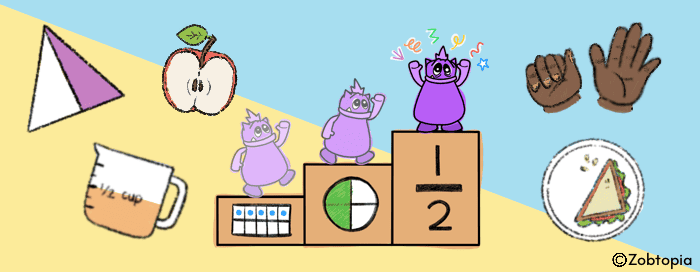Shortcut or Pathway? Building Skills One Step At A Time
- Gradual Learning in Math: Advanced understanding in mathematics is best achieved through a gradual, systematic approach rather than quick-fix methods.
- Role of Learning Progressions: These frameworks effectively sequence math curriculum and instruction, guiding students through complex subjects while monitoring and assessing their understanding of different math concepts.
- Specifics of Our ILPs: Our Intentional Learning Progressions in digital math learning are based on three principles: following natural development progressions, building skills around each developmental stage, and avoiding assumptions about students' prior knowledge and experiences. This approach is designed to enhance individual student learning experiences, ensuring each step in their education is meaningful and builds on previous knowledge.
Leap Frog?
The story goes that if you place a frog in a pot of room temperature water and slowly bring the water to boil, the frog will never realize the need to jump out as it acclimates to the temperature increase, even to the point of ultimate demise for the unfortunately adaptable amphibian.
While the story is thankfully a myth—and it apparently took several actual experiments to prove such ?—its persistence in culture conveys a basic and common human appreciation for the incredible power of incremental change over time.
In mathematics education, it is precisely this sort of incremental change that enables students to develop advanced understanding of complex topics [1] [2] [3]. In this way, digital math interventions, like our app, are not shortcuts to improved outcomes but rather pathways for ongoing development.
Learning Progressions
Learning progressions are frameworks for sequencing and organizing curriculum, instruction, and assessment to guide students through the complexities of the subject [1]. Learning progressions recognize learning as a process of developing an increasingly connected and coherent set of ideas [2].
Research on learning progressions in mathematics education highlights their effectiveness in enhancing instructional practices, their value of monitoring student understanding across diverse mathematical topics, and their significance in tracking student progress through various mathematical concepts [4].
Intentional Learning Progressions
Learning progressions in digital environments have been shown to result in greater academic gains compared with traditional instruction [5] [6]. However, game-based learning environments often engage students with content or features that are irrelevant to or unsupportive of the overall learning progression [5].
That is why, in our app we have developed Intentional Learning Progressions (ILPs) that integrate developmental coherence [4] amongst all aspects of the learning experience and learning interactions.
Furthermore, we ground our ILPs on three essential principles, with the goal of maximizing the support they provide to each individual learner.
Principle 1: Follow the Flow
First, our ILPs follow students’ natural development progressions.
Research on children aged 3 to 9 years old shows a common developmental progression in constructing number knowledge. Initially, by age 4, children develop separate networks of counting and quantity knowledge, which they then integrate in kindergarten, connecting to formal symbols around 6-7 years old, and expanding to double-digit numbers and the base-ten system by 8 or 9 years [7].
A 3-year randomized study of K-5 math students from 46 urban, suburban, and rural schools found that students who were taught grade-level algebra instructional sequences as part of the regular math instruction significantly outperformed their peers who received only regular instruction for for up to a year beyond the intervention [8].
While we follow these natural progressions, we also incorporate instruction that builds skill through interactions with strategically familiar numbers and scenarios.
A study of 1,168 students in grades 4, 5, and 6 in a game-based math learning app demonstrated that students will practice with familiar numbers as they develop their knowledge of and test their emerging skills with new concepts [5].
Principle 2: Every Step Counts
Next, we build skill around each developmental progression.
Each new idea that is presented to children must connect to their existing knowledge [7]. Additionally, since children's ability to grasp complex information is limited, it is essential to provide students with enough practice to develop proficiency with each related concept [7] [5].
A study of 100 students ages 3-8 using digital manipulatives to complete a variety of math sequences found that students advance in their learning only once they achieve a competence amongst a critical mass of interconnected ideas [6]. In other words, for students to “get something” to the point where they are able to apply their new knowledge, productively build upon it, and ultimately transfer it, they must first have a solid foundational understanding of the myriad underlying ideas and concepts assumed within that new knowledge.
Principle 3: Don’t Make Assumptions
Finally, we avoid assumptions that can hinder development.
In mathematics instruction, the effectiveness of teaching methods, including problem-solving exercises, hinges on students' familiarity with the context and their specific knowledge and skills [9]. This reliance on context can present challenges, particularly when the material assumes cultural or experiential knowledge that not all students share [10].
Because learning mathematics depends on each person's unique cognitive structure [11], when designing learning experiences and interactions, it is essential to recognize and accommodate these individual differences and the unique backgrounds of all students [12].
Developing Progression
We designed our learning progressions to intentionally engage students in carefully-sequenced, multi-level activities that are appropriate to each individual student’s current level of understanding. As a result, our ILPs build competence and confidence to support ongoing knowledge and skill development . . . one step at a time.
References
[1] Duschl, R. A. (2019). Learning progressions: Framing and designing coherent sequences for STEM education. Disciplinary and Interdisciplinary Science Education Research, 1(1), 1-10. https://doi.org/10.1186/s43031-019-0005-x
[2] Kubsch, M., Czinczel, B., Lossjew, J., Wyrwich, T., Bednorz, D., Bernholt, S., ... & Rummel, N. (2022). Toward learning progression analytics—Developing learning environments for the automated analysis of learning using evidence centered design. In Frontiers in education (Vol. 7, p. 981910). Frontiers.
[3] Fonger, N. L., Stephens, A., Blanton, M., Isler, I., Knuth, E., & Gardiner, A. M. (2018). Developing a learning progression for curriculum, instruction, and student learning: An example from mathematics education. Cognition and Instruction, 36(1), 30-55. https://doi.org/10.1080/07370008.2017.1392965
[4] Jin, H., Mikeska, J. N., Hokayem, H., & Mavronikolas, E. (2019). Toward coherence in curriculum, instruction, and assessment: A review of learning progression literature. Science Education, 103(5), 1206-1234. https://doi.org/10.1002/sce.21525
[5] Brezovszky, B., McMullen, J., Veermans, K., Hannula-Sormunen, M. M., Rodríguez-Aflecht, G., Pongsakdi, N., ... & Lehtinen, E. (2019). Effects of a mathematics game-based learning environment on primary school students' adaptive number knowledge. Computers & Education, 128, 63-74. https://doi.org/10.1016/j.compedu.2018.09.011
[6] Watts, C. M., Moyer-Packenham, P. S., Tucker, S. I., Bullock, E. P., Shumway, J. F., Westenskow, A., ... & Jordan, K. (2016). An examination of children's learning progression shifts while using touch screen virtual manipulative mathematics apps. Computers in Human Behavior, 64, 814-828. http://dx.doi.org/10.1016/j.chb.2016.07.029
[7] Griffin, S. (2004). Building number sense with Number Worlds: A mathematics program for young children. Early childhood research quarterly, 19(1), 173-180. https://doi.org/10.1016/j.ecresq.2004.01.012
[8] Blanton, M. (2022). The Role of Learning Progressions in" Democratizing" Students' Access to Algebra. North American Chapter of the International Group for the Psychology of Mathematics Education. https://eric.ed.gov/?id=ED630373
[9] Verschaffel, L., Schukajlow, S., Star, J., & Van Dooren, W. (2020). Word problems in mathematics education: A survey. ZDM, 52, 1-16. https://doi.org/10.1007/s11858-020-01130-4
[10] Abdulrahim, N. A., & Orosco, M. J. (2020). Culturally responsive mathematics teaching: A research synthesis. The urban review, 52, 1-25. https://doi.org/10.1007/s11256-019-00509-2
[11] Umbara, U., & Suryadi, D. (2019). Re-Interpretation of Mathematical Literacy Based on the Teacher's Perspective. International Journal of Instruction, 12(4), 789-806. https://doi.org/10.29333/iji.2019.12450a
[12] Wildfeuer, S. (2022). Ethnomathematics and Cultural Identity to Promote Culturally Responsive Pedagogical Choices for Teachers in Early Childhood and Elementary Education. In Handbook of Cognitive Mathematics (pp. 115-128). Cham: Springer International Publishing.



